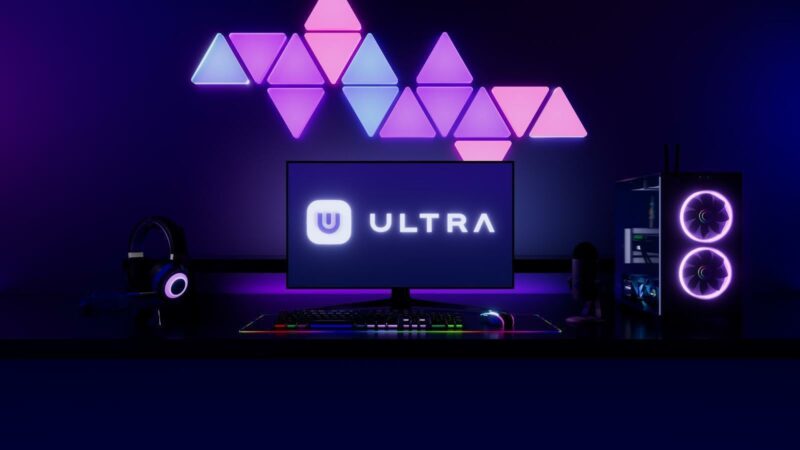Ultra has an assertive vision: Redefining the games industry. As a relatively new games company that’s active in a novel part of the industry, which is Web3 games, this vision might sound very hard to achieve. But new companies in newly emerging industries have the luxury of defining the borders if they have the courage, expertise, and knowledge supported by the power of imagination. So we interviewed Nicolas Gilot, the Founder and CEO of Ultra, to find out about his expertise, the border he plans to dare to push, and what he imagines for the Ultra and Web3 games genre. We thank him for his time and this interview and leave you to it without further ado.
Can you tell us what Ultra does and how it positions itself in the game industry?
Sure! Ultra positions itself as an up-and-coming gaming application ecosystem that creates new and exciting opportunities for players, developers, and influencers. For players, Ultra is redefining the concept of digital item ownership and identity. With our Uniq (NFT) token standard, we’re unlocking new possibilities for utilities and rewards linked to owning digital items. Through our games store, marketplace, and tournament app, game developers and publishers can leverage the Ultra ecosystem to build communities, monetize their content, and create rewarding experiences for players. With all of this, we’re looking to be the platform that initiates a new level of engagement for both game developers and gamers themselves.
What weaknesses or shortcomings do you detect in Web2 gaming, and how does Web3 gaming solve these problems? What is Ultra’s role in these solutions?
One of the core issues with the current traditional gaming landscape is the lack of ownership players have with both their gaming assets and their data. Every asset in games is stored in centralized data systems, meaning the player cannot take their hard work outside of the game itself. With the use of Web3 concepts, there is the potential for players to monetize their gaming experience, as well as unlock other benefits that could be associated with digital item ownership. Open and secure marketplaces can be developed around valuable digital assets that weren’t previously possible, and all parties involved can tap into these benefits. Ultra’s role is to try and make these ideas become a reality with a user experience that’s comfortable for everyone involved.
Traditional gaming keeps pushing business models like cloud gaming and games as a service, even though they are yet to gain traction. It’s obvious that the industry is looking and pushing for innovation, yet why do you think game industry giants are hesitant to get involved in Web3 or blockchain gaming?
Transitioning to blockchain entails a significant departure from a system that already boasts billions of users. Although blockchain shows tremendous promise across various industries, widespread adoption remains a somewhat distant goal. Until we witness the mass integration of this technology in sectors like gaming, major players are likely to hold back from incorporating it into their frameworks. However, the Web3 gaming space continues to onboard talented developers and promising games, steadily building momentum. As history has demonstrated, a single-hit game has the
power to attract millions of players, potentially serving as the catalyst for blockchain’s eventual inclusion by industry giants.
What do you think about the future of mainstream gaming stores? What do you think the course of their evolution will be?
The future of mainstream gaming stores is undoubtedly set to undergo significant evolution. Currently, gaming platforms like Steam, Epic, and GOG are experiencing remarkable growth, and this upward trend is projected to continue in the years ahead. However, as Web3 games gain popularity and attract a substantial player base, a shift in the gaming landscape is inevitable.
With the rise of Web3 games comes a surge in demand for these innovative titles to be made available on mainstream store catalogs. To remain competitive and relevant in the changing game industry, stores like Steam will have to adapt their technology and infrastructure. This adaptation will involve integrating support for blockchain-based games, enabling players to access and enjoy the unique features and benefits offered.
Ultra has an assertive vision of redefining the game industry. Can you tell us how Ultra achieves or progresses toward this vision, especially while focusing on an emerging and evolving part of the industry like Web3 gaming? What impact Ultra has on the industry?
Unlike traditional stores, Ultra aims to provide gamers with more than just a place to buy games; it offers an all-encompassing environment where players can not only play but compete and also trade games and in-game rewards. In this ecosystem, Ultra seeks to incorporate everything that successful game stores already offer while introducing additional features that enhance both the gaming experience for players and the offerings for game developers.
By enriching the interactions between gamers and developers, Ultra aims to foster vibrant gaming communities and provide developers with new tools to engage and connect with their player base. While the web3 gaming space is still emerging, Ultra’s unique approach to catering to both developers hopes to be a potential catalyst for accelerating the adoption of blockchain-based gaming.
How Ultra is evolving with the industry? When you look back at where you started, do you see Ultra arrived at a point different than initially intended?
As the Web3 and gaming industries continue to evolve, we firmly believe that our technology and ecosystem are well-suited for the present and future landscape of both industries. At this moment, we are prepared to offer the finest games, and our blockchain infrastructure is being developed with a focus on mainstream readiness, surpassing the advancements of other existing gaming-focused blockchains.
Our journey has been long, but we have made remarkable strides across all key aspects of our ecosystem. Significant progress has been achieved, and we are on a solid track to realizing our vision. This year, we have reached several pivotal milestones, successfully exposing our ecosystem to the public and garnering interest and excitement from the Web3 gaming community.
Does Ultra have specific customs and business practices to be adaptive? How does Ultra compete in such a competitive market?
We’re constantly looking at new ways to enhance the experience within our ecosystem for players and developers. While we carefully observe and study our competitors, our primary focus remains on crafting a gaming experience that excites players. We prioritize creating an environment where players feel at ease, embracing the benefits of blockchain technology without really feeling that they’re using a blockchain.
On the developer front, we recognize that the blockchain space is becoming increasingly competitive in attracting game developers. As we pave the way for a blockchain that is developer-friendly and ready to onboard talent, we have proactively strengthened our network to address the limitations found in some competitor blockchains. Our goal is to provide developers with a robust platform that supports seamless game development, fosters creativity, and maximizes the potential of growing their games.
Can you tell us about Ultra’s engagement with esports industry?
Esports is a crucial pillar of Ultra’s vision. We recently released Ultra Arena to the public, a tournament app built on Ultra’s technology in conjunction with CLD and another unannounced partner. The goal of Arena is to make competitive gaming more accessible to a wide array of players, creating opportunities for amateur and professional players to compete for a new era of rewards. Our Uniq (NFT) Standard opens the doors to creating entirely new esports experiences for players. We’re introducing features such as gated access and a new realm of token-based rewards that can be linked to anything (digital or physical). Our first month of tournaments has already filled with players, so it’s been an exciting start.
Can you tell us about Ultra’s plans for the future and strategy?
Currently, our primary focus is on optimizing our core applications and continuously improving our token standard. We believe that these efforts are essential for providing a seamless and efficient experience to our users. As we work on these aspects, we have a lineup of exciting milestones and releases in the pipeline, one of which is our exclusive AAA shooter, which is currently in development.
The development of our AAA shooter is progressing remarkably well, and we are excited about the potential it holds in bringing Web2 players to the Ultra ecosystem.
Is there anything else that you like to share with our readers?
Thanks for having me! I’d like to use this opportunity to give a big shoutout to the Ultra community. There truly isn’t a community like it anywhere else.

Nicolas Gilot
Co-Founder & CEO at Ultra
Nicolas is a highly engaged leader who oversees all core operations at Ultra, leveraging his extensive experience in the gaming industry to drive the company’s success. Nicolas possesses a deep understanding of what it takes to create compelling game experiences that resonate with audiences. Nicolas joined forces with his friend David to esablish Ultra, a visionary platform designed to revolutionize the PC gaming experience. Since its inception in 2017, Ultra has grown to become a team of over 90 skilled professionals, all united by a common goal to reshape the gaming industry.





